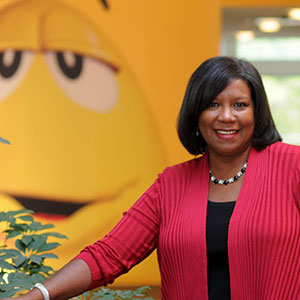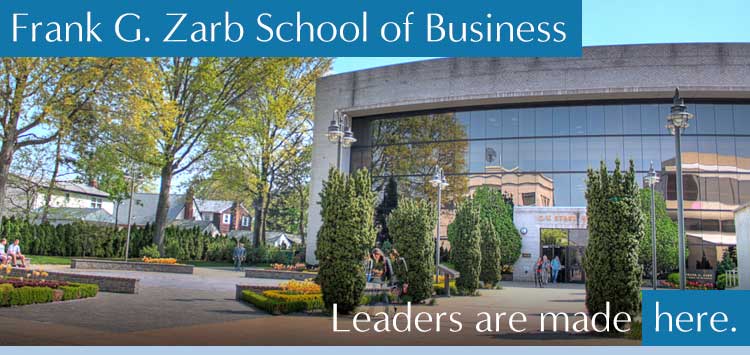Debra Sandler has been president of Mars Chocolate North America since March 2012. She joined Mars in 2009 as chief consumer officer. Before that, she spent 11 years at Johnson & Johnson, serving as Worldwide President of McNeil Nutritionals, maker of products including Splenda, and Worldwide Franchise Vice President for women's health. She also spent more than a decade with PepsiCo in various executive positions.
Why did you choose Hofstra?
In many respects, Hofstra chose me in that I was very interested in a career in international business. I wanted to combine my interest in business with my love of languages and when I was looking for colleges, there were not too many at that time that offered programs in international business. I came from the Caribbean and I was very interested in coming to a school where I could build strong relationships, and Hofstra as a mid-sized school offered that. I personally felt that I would function better in an environment where I could build a relationship with my teachers, get to know them and have them get to know me.
What are some of your best memories of your time at Hofstra?
I think what I remember most is my involvement in school – I was an R.A. my senior year, I ran on a ticket for student government and I was president of the African-Caribbean Society. I really felt a part of the school and a part of the culture.
Debra Sandler, '82, B.B.A.
President, Mars Chocolate North America

"I think to get people to follow, you've got to inspire. "
And it was where I had my first exposure to activism. We wanted the university to divest of investments in South Africa. We had a sit-in. I remember being very nervous about it. We sat in at the president’s office. I’m not sure how long we sat in – it felt like forever. Sometime after that, the university did divest. I think back on that time, and I think what it did is reinforce that you can change things. And I sort of live by that to this day. If you’re unhappy about something, then do something about it.
Were there any Zarb professors who were mentors, who inspired you?
One of my absolute favorites was Professor (Rusty) Moore for international business. When you’re young and you think you like something and then you start learning about it and you realize – I really do love it. Professor Moore was someone who fueled my love and passion for international business.
Professor (Louis) Benton, who I had for Management 101, was also one those professors I went back to many times because he was just always a good sounding board. I believe he told us – and it’s something I live by and recommend – when you’re choosing companies, choose those where your opportunities grow as you rise in the organization. It was one of the things, as I considered which companies to go to, that I would think about.
You are a working mother who has successfully ascended the corporate ladder at several companies. What is your take on the debate over work-life balance, and the relative lack of woman leaders in corporate America, as framed by Facebook CEO Sheryl Sandberg in her book, Lean In?
I think many women feel balance is a destination, that at some point you arrive at balance and that’s it. For me, balance is something I work on every week and every day. I am very, very clear about my priorities. There are times when work will be more important than things going on at home and there are some things at home that I will never trade off on. I remember once I had a very big business dinner with my boss, the customer and the senior leadership team on the same evening as the science fair. I told her “I’ll be in the meeting all day and I will do everything that’s needed but I can’t be there for the evening dinner.” I really wrestled over it but when I told my boss, she said “Ok.” It wasn’t as big an issue as I maybe made it in my mind. It did help that my boss was a woman, but I’ve had the same type of conversations with male bosses. I don’t do it all the time, but I do it for the things that are important to me. So I absolutely say lean in – nobody else is going to do it for you.
What makes a good leader?
Fundamentally, if you’re a leader, you have to be someone that people will follow. I think to get people to follow, you’ve got to inspire. You have to touch people’s hearts and capture their imaginations. It’s someone who is clear about the landscape – what we are working toward – as well as how we get there together.
What’s your leadership style?
Collaborative. As a leader you have to sometimes stop and follow. You don’t always have to be out in front. There are times when I’m going to be out front and sometimes I’m very comfortable to let someone else be out front. A good leader can share and be generous with their leadership.
How has your leadership style changed over the years?
Patience is the biggest change. I honestly don’t know what I was rushing to – but I was in a big hurry as a younger person. It was very much “when’s the next promotion?” I spent 13 great years at PepsiCo but in that time, I probably had about eight jobs so I got used to a pretty fast pace and enjoyed that. Over time, what I’ve come to prefer is to stay in an assignment long enough to lap the decisions I made the year before. It’s not just the doing of the thing this year, but seeing the lasting impact of the decisions.
Early on in your career, it’s more about your contribution, your work, your product. As you evolve, it’s less about you and more about the people around you, more about the people you are able to cultivate and grow.
You’re a member of Hofstra’s Board of Trustees. What is it like to help guide policy and development for your alma mater?
It’s a little strange for me and never stranger than just a couple of months ago when I was asked to speak at the graduation for the business school. It took me back to when I was sitting in that audience, graduating. I just have really fond memories of the school and want more people to know about it and what it offers. I’d just love to see more people consider Hofstra as a choice. In my view, it’s right there and not everybody knows about us – and we have so much to offer.
Compare Hofstra today, with the Hofstra you attended.
I’m impressed how the school has grown and taken itself seriously. They haven’t rested on their laurels, they are staying contemporary and modern and relevant. My nephew is a sophomore at Zarb now and I feel like the school has gotten much bigger and even more diverse than when I was there. My nephew – he was in a dorm with someone from the Philippines, someone from Malaysia and someone from New Jersey. That kind of experience is everything.
I really remain committed to Hofstra – I try to give people the benefit of my perspective and be a proud alum. Whenever I’m asked to go back and speak, I do. And when I look for interns, I’m very concerned about getting Hofstra interns here.
